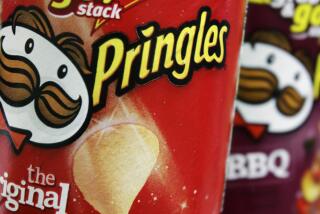Nestle Reportedly Agrees to Buy Ralston Purina
- Share via
Pet-food maker Ralston Purina Co. has reportedly accepted a $10.1-billion takeover offer from Nestle, the Swiss food giant whose products include Friskies cat food and Alpo dog food.
The boards of both companies approved the deal Monday afternoon, and an announcement is expected by today, the Wall Street Journal reported on its Web site Monday, citing people familiar with the situation.
Nestle would pay $33.50 for each share of Ralston, a 36% premium on the St. Louis-based company’s closing stock price Friday of $24.63 on the New York Stock Exchange.
Ralston Purina refused to comment on the report. Officials at Nestle could not be reached.
The U.S. pet-food industry is growing at 6.5%, twice the rate of food for people, yet acquisitions are cheaper. A $10-billion bid amounts to 17 times Ralston’s operating profit. Philip Morris Cos. bought Nabisco Holding Corp. at a ratio of 22 and Unilever paid 18 times for Bestfoods.
Jaine Mehring, senior food analyst at Salomon Smith Barney in New York, said the possibility of such an offer does not come as a surprise given Nestle’s desire to expand its pet-food offerings.
If the transaction is completed, she said, Nestle’s market share in the United States would double. Similarly, Mehring said, the Ralston brand could prosper overseas through Nestle’s international distribution system.
Based on measured sales, Ralston controls 27% of the $4.3-billion dog-food market, while Nestle accounts for about 12%, the Journal reported. Ralston is also a leader in cat-food sales, holding 33% of the $2.6-billion market, with Nestle making up for an additional 13%.
Mehring said when industry estimates for unmeasured sales are taken into account, Nestle and Ralston Purina each command about 15% of U.S. market share.
An agreement would probably receive antitrust scrutiny, and the companies could be required to trim their pet-food businesses to gain regulatory approval.
Rival companies with significant pet-food units, such as Procter & Gamble Co., Colgate-Palmolive Co. and Mars Inc., could try to outbid Nestle.
“There’s always a chance of some other bidder,” Mehring said. “I think it’s a pretty fair price.”
Nestle, the world’s largest food company, produces everything from mineral water to dairy products to coffee. The company is based in Vevey, Switzerland.
Nestle has enlarged its pet-food business in the past through acquisitions. In 1985, the company purchased Carnation, which owned Friskies, and in 1994 it added the Alpo brand to its holdings.
The company picked up one-fifth of Europe’s pet-food market in 1998, when it paid more than $1 billion for Britain’s Spillers Pet Food, a subsidiary of Dalgety Group. Nationwide, dog-food sales grew by about 4% last year, while cat-food volume grew by about 5%.
The pet-food market has become increasingly attractive with the number of dogs rising 1.5% annually and the cat population increasing by 2.3%. About 400 cat- and dog-food products were introduced in the U.S. last year, twice as many as three years earlier, according to Marketing Intelligence, a Naples, N.Y.-based research firm that tracks new products.
More to Read
Inside the business of entertainment
The Wide Shot brings you news, analysis and insights on everything from streaming wars to production — and what it all means for the future.
You may occasionally receive promotional content from the Los Angeles Times.









